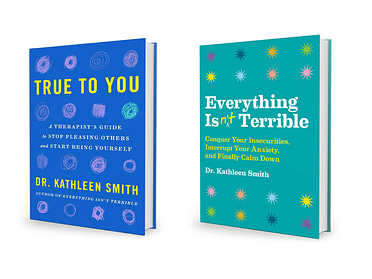Our allergic-ness to others shows up in our work. One of the great human pastimes is coming home and pouring a refreshing beverage before detailing the most recent, hot mess in which your bizarre assemblage of colleagues has now found themselves. Or hopping into the group chat to gift some flavorful drama. Have you seen of any of these behaviors at work lately?
What people often fail to see is that being judgy about these anxiety-managing patterns is its own managing-anxiety pattern. Yes Denise, yet another bus stop on the path to stuckness. Downward comparison (at least I’m not like them) or simply focusing on the other’s flaws is a great way to get steady—temporarily. But what is the cost when the relative calmness in a system is purchased through criticism of the other? Creativity, flexibility, and curiosity all take a hit. I am fascinated by individuals who are able to be more neutral about what other people do to get steady. When someone can say, “It makes sense that she would sit back and do nothing when so many are doing things for her.” Or, “this organization has really chugged along partly because the conflict has stayed locked between these two people.” When they sound more like a naturalist, and less like a critic. Emotional neutrality isn’t a stamp of a approval. It isn’t putting up with people’s bad behaviors. Neutrality is seeing that the ways we get calm are pretty universal and predictable. It’s noting that you can get the farthest by tinkering with your own part in the larger system. This is how a person shifts to the “I.” What am I going to do when others are badmouthing someone? What questions do I ask when everyone has piled onto one person? How do I want to respond when someone is trying to micromanage me? How do I want to function in a meeting that might not be run so well? Over time, these efforts of directing oneself dial down the sensitivity to the other. They dial down the tendency to diagnose or label others. They possibly even free up the system to do something other than be mad at the boss or jump from conflict to conflict. Questions:
How do you want to become a better of observer of your own habits when it comes to getting steady? Similar posts:
News from Kathleen**Thanksgiving Q&A: Thanksgiving is on its way for the Americans! If you’ve got a family-related or holiday-related question you want me to answer in my newsletter this month, just email me. Buy my books True to You and Everything Isn’t Terrible for more in-depth stories of people working on their relationships and themselves. If you love them, consider giving them a review on Amazon so other folks can find them. If you haven’t gotten the free digital workbooks for them, email me. Want to read more of my writing? Check out my newsletter archives. Paid subscribers can access the entire archive. Email me if you want me to speak to your group or are interested in doing coaching with me. Follow me on Linkedin, Facebook, or Instagram. You're currently a free subscriber to The Anxious Overachiever. For the full experience, upgrade your subscription. |
utorak, 4. studenoga 2025.
The Art of Being Less Annoyed by Your Colleagues
Pretplati se na:
Objavi komentare (Atom)
Day 4: Notice your emotions
How does eating make you feel? ͏ ͏ ͏ ͏ ͏ ͏ ͏ ͏ ͏ ͏ ...

-
Plus: Kicking off Pride Month with the new Goodnewspaper and more good news to celebrate! ...
-
Parents face new rules on childhood shots, while COVID vaccine access becomes more limited. ...
-
And nontoxic shampoos we've tried and loved ͏ ͏ ͏ ͏ ͏ ͏ ͏ ͏ ͏ ͏ ͏ ͏ ͏ ...


Nema komentara:
Objavi komentar